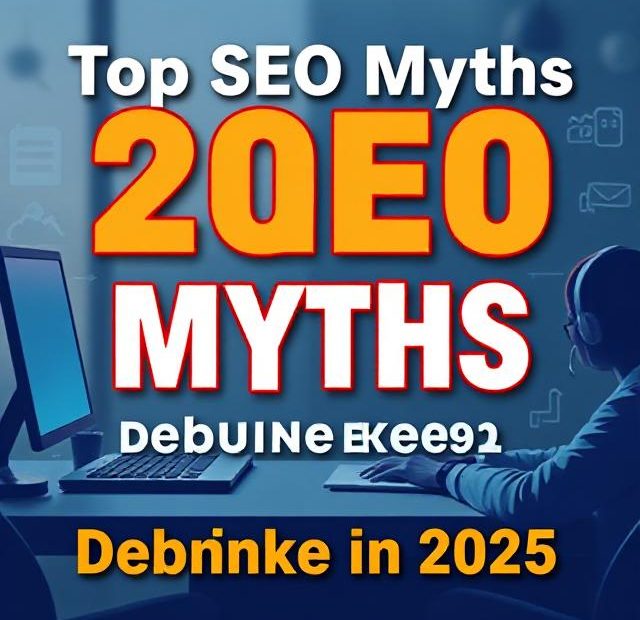Search engine optimization (SEO) is constantly evolving. What worked yesterday might hurt your rankings today. As we move through 2025, many outdated beliefs and misconceptions still linger, confusing business owners, marketers, and even some SEO professionals.
To stay ahead, you need to separate fact from fiction. In this post, we’re debunking the top SEO myths that no longer hold up in today’s digital landscape. Let’s set the record straight.
Myth 1: SEO Is Dead
The truth: SEO is far from dead. It’s just different now.
Every few years, people claim that SEO is over. But in 2025, SEO remains essential—especially with voice search, AI-driven content, and new algorithms shaping how people find information online. What has died is outdated SEO practices. Modern SEO focuses on experience, relevance, and technical precision—not keyword stuffing.
Myth 2: Keywords Are All That Matter
The truth: Keywords still matter, but not like they used to.
Gone are the days of jamming exact-match keywords into every sentence. Today, search engines understand natural language, context, and user intent. Using related terms, answering specific questions, and creating helpful content are more effective than repeating the same phrase over and over.
Myth 3: More Backlinks = Better Rankings
The truth: Quality backlinks matter more than quantity.
While backlinks are still one of Google’s top ranking signals, 2025’s algorithms prioritize relevance and authority over sheer numbers. A single link from a respected, niche-related site is more powerful than dozens from low-quality sources. Focus on earning links through thought leadership, useful content, and digital PR—not shortcuts.
Myth 4: AI-Generated Content Ranks Just as Well
The truth: Not unless it’s human-reviewed and value-driven.
AI tools like ChatGPT, Jasper, and others are powerful, but using them to mass-produce low-quality articles won’t help your rankings. Google’s Helpful Content System rewards original, people-first content. If you use AI, make sure to fact-check, edit for tone, and add human insights.
Myth 5: You Must Post Daily to Rank
The truth: Quality and consistency matter more than frequency.
Publishing useful content regularly is great—but there’s no magic number. What matters is how well your content addresses search intent and user needs. One well-researched post a week will outperform daily low-effort uploads.
Use tools like Google Search Console and analytics to find content gaps, not just fill space.
Myth 6: Meta Descriptions Improve Rankings
The truth: Meta descriptions don’t affect rankings directly.
While writing strong meta descriptions is still important for increasing click-through rates (CTR), Google doesn’t use them as a ranking factor. However, a compelling description can lead to more clicks—and better engagement metrics like time on site, which can influence rankings.
Myth 7: You Can Rank Without Technical SEO
The truth: You need technical SEO to compete.
Many businesses overlook site speed, mobile-friendliness, indexability, and structured data. In 2025, these factors are non-negotiable.
Core Web Vitals, crawl budget optimization, and schema markup all play critical roles in visibility. A beautiful blog post can’t rank if Google can’t crawl or understand your site.
Myth 8: Voice Search Requires Special SEO
The truth: Voice search is about natural language and helpful answers.
You don’t need a separate “voice SEO” strategy. Instead, focus on answering questions clearly and using conversational keywords. FAQ sections, concise headings, and structured content are more likely to get picked up in voice results.
Myth 9: Social Media Signals Directly Impact SEO
The truth: There’s no direct correlation—but they help indirectly.
Likes, shares, and comments don’t directly affect search rankings. However, social media drives brand awareness, increases visibility, and helps you earn backlinks—all of which support your SEO strategy.
So yes, social matters—but not in the way most people think.
Myth 10: Algorithm Updates Always Hurt Your Site
The truth: Not if you’re following best practices.
Google updates its algorithm hundreds of times a year. Most updates are minor, and many help good content rise rather than punish sites.
If your rankings drop after an update, it may reveal areas where your content or site structure needs improvement. Stay calm, check Google’s guidance, and focus on improving user experience.
Final Thoughts: What to Remember in 2025
Staying competitive in SEO means staying current. The biggest mistake you can make is relying on outdated tactics or following popular myths without verifying them.
Here’s what to focus on instead:
-
Create people-first, helpful content.
-
Earn high-quality, relevant backlinks.
-
Optimize for technical performance and user experience.
-
Stay updated with Google’s official guidelines and industry news.
Remember: the best SEO strategy is one that serves your audience, not just the algorithm.
✅ Bonus Tip: How to Spot an SEO Myth
If someone promises instant results, secret Google loopholes, or says, “This works for everyone,” take it with a grain of salt. Good SEO takes time, strategy, and ongoing effort. Stick to reliable sources and test everything.
Want help staying on top of the latest SEO strategies? Subscribe to a trusted newsletter, follow industry leaders, and always be ready to adapt. Because SEO in 2025 is smarter, more user-focused—and yes, still worth it.
Also, you can learn more about Myths & Misconceptions here.
